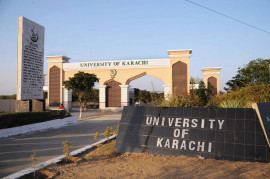
A two-member bench, comprising Justice Muhammad Ali Mazhar and Justice Yousuf Ali Sayeed, issued the directives during the hearing of a petition pertaining to the use of contaminated water for growing vegetables.
The petitioner's counsel appealed to the court to put an end to the use of the Malir River's contaminated water for cultivating vegetables.
At this, Justice Mazhar stressed that using water containing industrial waste for vegetable cultivation was "dangerous" and posed health risks and remarked, "Does nobody have any control over [the discharge of] wastewater?"
In response, the Malir deputy commissioner (DC) informed the court that waste from several industrial units was being discharged into Malir River.
This polluted water was being used to cultivate vegetables, the court remarked, adding that it was a matter of serious concern.
The Korangi DC informed the court that the issue was brought to the relevant authorities' attention earlier too.
Irked by this information, the court asked the DC to seek the police's assistance to resolve the problem and commented, "Is there nobody to monitor whether [clean] or filthy is used for growing vegetables?"
The DCs maintained that they had taken action against those using wastewater for vegetable cultivation multiple times but filthy water was being used widely for the purpose, implying that it was hard to curb the widespread practice.
"Then what has the food authority been doing in this regard? Why does it not take any action?" the court inquired.
At this, the officials pointed out that the agriculture department too could play an important role in resolving the issue. The court then asked for their suggestions to stop the use of such water for growing vegetables.
The court further remarked that the use of wastewater for the purpose should be stopped immediately as it might cause the spread of various diseases and issued notices to Central, West and East DCs, seeking their replies on the matter.
Besides, it directed the relevant DCs and officials to seek police help on the matter, form a taskforce to deal with the problem and take immediate action against the use of wastewater for growing vegetables.
Keamari gas leak
The bench also directed the Sindh Environmental Protection Agency (SEPA) and the plant protection department (PPD) to prepare and present a report on the Keamari gas leak mystery at the next hearing of multiple petitions filed against the toxic gas leak.
It stated that the cause behind the leak needed to be identified in order for the court to decide on the matter.
The court ordered SEPA and the PPD to prepare a detailed report on the incident till the next hearing, identifying the cause of the leak.
It adjourned the hearing till April 7.
Substandard medicines case
At another hearing, the bench also ordered the drug quality control board to verify the registration of medicine manufacturing companies and investigate the supply of substandard drugs to Dr Ruth Pfau Civil Hospital.
During the hearing, the additional health secretary informed the court that the matter was referred to the provincial drug quality control board and caches of medicines found to be substandard were sealed.
At this, Justice Mazhar, rebuking the secretary, said that the supply of substandard medicines was a criminal offence and asked him to tell the name of the syrup that was found to be substandard.
In reply, Sindh additional prosecutor general said that the syrup was Zambak and 95,000 bottles of the syrup were found to be substandard.
Inquiring about the action taken by the drug quality control board on the matter, the court summoned the additional health secretary at the next hearing on March 31. It also ordered the drug quality control board to verify the registration of the pharmaceutical company manufacturing Zambak and probe into the matter.
'Reach settlement'
Meanwhile, a two-member bench, comprising Justice Ahmed Ali Shaikh and Justice Omar Sial, directed the accused's counsel, the National Accountability Bureau (NAB) and defrauded citizens, who were allotted apartments in Silver Sands residential building project, to negotiate and reach a settlement.
The defrauded citizens informed the court that they had not been handed over the apartments for the past 25 years and maintained that the while the accused was out on bail, NAB did little to ensure that they got their money back. They moved the court to order that the citizens be paid as per the current value of the property and not that in 2012.
At this, Justice Shaikh remarked, "I understand what you have been through and the same happened with me when I booked an apartment."
The court, however, directed the accused's counsel, the NAB and the defrauded citizens negotiate and reach a settlement on the matter. The court adjourned the hearing for an indefinite period.
WITH ADDITIONAL INPUT FROM PPI
Published in The Express Tribune, March 12th, 2020.


1727419152-0/BeFunky-collage-(18)1727419152-0-165x106.webp)



1727415147-0/Untitled-design-(43)1727415147-0-270x192.webp)










COMMENTS
Comments are moderated and generally will be posted if they are on-topic and not abusive.
For more information, please see our Comments FAQ